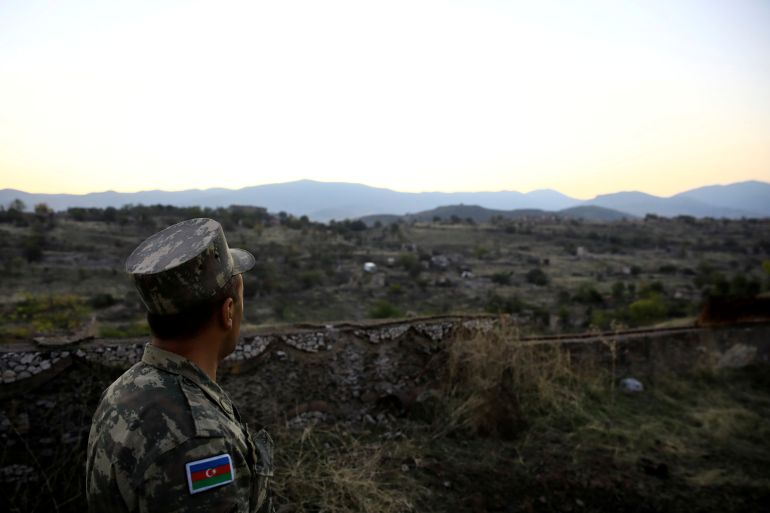Death toll in Azerbaijan-Armenia border clashes rises
United Nations welcomes ceasefire after 176 soldiers killed in two days of fighting, which each side blames on the other.

Azerbaijan says 71 of its troops have been killed this week during border clashes with Armenia, which marked the worst fighting between the rival neighbours since their 2020 war over the disputed Nagorno-Karabakh region.
Armenia said 105 of its soldiers died in the violence, which each side blames on the other.
Keep reading
list of 4 itemsWhat’s behind renewed fighting between Armenia and Azerbaijan?
‘Situation tense’: Armenia reports new clashes with Azerbaijan
Armenia, Azerbaijan trade blame over deadly border clashes
The flare-up threatened to drag Turkey, Azerbaijan’s key backer, and Armenia’s ally Russia into a wider conflict at a time of already high geopolitical tensions.
A senior Armenian official said the two sides had negotiated a ceasefire, which took effect at 8pm local time (16:00 GMT) on Wednesday.
The United Nations welcomed the ceasefire on Thursday. UN Assistant Secretary-General Miroslav Jenca said: “The international community must remain fully committed to a peaceful settlement between Armenia and Azerbaijan and spare no effort to de-escalate the current tensions, bring the parties back to the negotiation table and help them achieve peace and stability in the region.”
Armenia’s defence ministry said the situation along the shared border was quiet following the deal, and that no ceasefire violations were reported. There was no immediate comment from Azerbaijan on the reported agreement.
A previous ceasefire brokered by Russia on Tuesday quickly failed.
Armenia and Azerbaijan have repeatedly traded blame for the fighting this week, which first broke out in the early hours of Tuesday morning and has taken place in areas away from Nagorno-Karabakh, an enclave that lies inside Azerbaijan but is mainly populated by ethnic Armenians.
Armenian authorities have accused Baku of unleashing a number of unprovoked cross-border attacks, while Azerbaijani officials claim their forces responded to initial Armenian “provocations”.
Al Jazeera was unable to independently verify the battlefield accounts from either side.
Tensions simmer
The recent fighting has sparked fears of another full-fledged war between the ex-Soviet states, which have been locked in a decades-old conflict over Nagorno-Karabakh.
The two countries fought a war over the contested region in late 2020 that killed more than 6,500 people in little more than six weeks.
The conflict saw Azerbaijan successfully win back swathes of territory in and around Nagorno-Karabakh that had been controlled by ethnic Armenian forces backed by Yerevan since an earlier war in the area ended in 1994.
Russia, a regional power broker, oversaw a ceasefire deal in November 2020 to end the fighting and deployed nearly 2,000 peacekeepers to the region as part of the agreement. Armenia has appealed to Moscow for assistance again this week following the latest clashes.
Meanwhile, Armenian Prime Minister Nikol Pashinyan has signalled that his government is ready to recognise Azerbaijan’s territorial integrity in a future peace treaty, provided that it relinquishes control of areas in Armenia its forces have seized.
“We want to sign a document, for which many people will criticise and denounce us and call us traitors, and they may even decide to remove us from office, but we would be grateful if Armenia gets a lasting peace and security as a result of it,” Pashinyan told Armenian legislators on Wednesday.
But some in the opposition saw the statement as a sign of the prime minister’s readiness to cave in to Azerbaijani demands and recognise Azerbaijan’s sovereignty over Nagorno-Karabakh.
Thousands of angry protesters quickly descended on the government’s headquarters, accusing Pashinyan of treason and demanding he step down. Protests were also held in other Armenian cities.